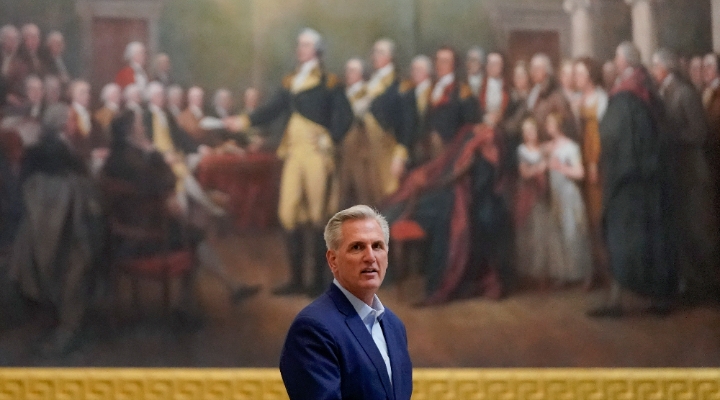Berkshire Hathaway (BRK.A/BRK.B) has released its second-quarter holdings. As it was during the first quarter of 2023, Berkshire was a net seller of stocks during the second quarter. That’s not surprising, given the continued strength of the stock market: The Morningstar US Market Index was up more than 8% during the quarter.
Here’s a look at some of the stocks that Warren Buffett and his team bought and sold during the second quarter, as well as three undervalued Warren Buffett stocks in Berkshire Hathaway’s portfolio today.
5 Stocks Warren Buffett’s Berkshire Hathaway Bought
|
| Occidental Petroleum OXY |
Add to Existing |
3 stars |
| Capital One Financial COF |
Add to Existing |
4 stars |
| D.R. Horton DHI |
New Position |
3 stars |
| NVR NVR |
New Position |
3 stars (Quantitative Rating) |
| Lennar LEN |
New Position |
3 stars |
Berkshire continued to add to its position in Occidental Petroleum OXY during the second quarter and boosted its stake in Capital One Financial COF, a position Berkshire first began building during the first quarter of 2023. Perhaps most notably, though, Berkshire took new positions in three residential homebuilders during the second quarter: D.R. Horton DHI, NVR NVR, and Lennar LEN.
Apple stock remains Berkshire’s largest holding—by a landslide.
8 Stocks Warren Buffett’s Berkshire Hathaway Sold
|
| Chevron CVX |
Scaled Back |
3 stars |
| Activision Blizzard ATVI |
Scaled Back |
3 stars |
| General Motors GM |
Scaled Back |
5 stars |
| Celanese CE |
Scaled Back |
4 stars |
| Globe Life GL |
Scaled Back |
4 stars (Quantitative Rating) |
| McKesson MCK |
Sold Entirely |
3 stars |
| Marsh & McLennan MMC |
Sold Entirely |
2 stars |
| Vitesse Energy VTS |
Sold Entirely |
3 stars (Quantitative Rating) |
Berkshire scaled back two of its energy holdings, peeling back its Chevron (CVX) position and selling its Vitesse Energy (VTS) stake outright (though it did, of course, increase its Oxy stake). The position in insurer Global Life (GL) was trimmed, and insurance broker Marsh & McLennan (MMC) was eliminated entirely from the portfolio. Berkshire reduced its stake in Activision Blizzard (ATVI) ahead of the expected merger with Microsoft (MSFT) and continued to reduce its stake in General Motors (GM).
3 Warren Buffett Stock Picks
Many of the publicly traded stocks held by Berkshire Hathaway are fairly valued or overvalued today, according to Morningstar’s metrics. These stocks were among Berkshire Hathaway’s holdings in the most recent quarter, and they looked undervalued as of Aug. 14, 2023.
- Kraft Heinz KHC
- Capital One Financial COF
- Paramount Global PARA
Here’s a little bit about why we like each of these stocks at these prices, along with some key metrics for each. All data is as of Aug. 14.
Kraft Heinz
- Morningstar Rating: 5 stars
- Morningstar Economic Moat Rating: None
- Morningstar Capital Allocation Rating: Standard
- Industry: Packaged Foods
Berkshire Hathaway owns more than 25% of Kraft Heinz’s stock. The packaged foods manufacturer has revamped its road map and is now focused on consistently driving profitable growth. We think Kraft Heinz stock is worth US$53, and shares are trading at a 35% discount to that fair value today.
Here’s what Morningstar director Erin Lash thinks of Kraft Heinz after the company reported second-quarter earnings:
Despite headwinds, sales continued to climb in no-moat Kraft Heinz’s second quarter, up 4% on an organic basis on top of 10% growth a year ago. Adjusted gross and operating margins expanded 180 and 90 basis points, respectively, to 33.3% and 20.6%. Pricing was a major driver of the performance, serving as an 11% benefit to the top line. However, we don’t think management is focused only on raising prices. Rather, we attribute recent marks to the strategic playbook that CEO Miguel Patricio crafted upon taking the helm in 2019, anchored in extracting inefficiencies from the business (with a target of unlocking US$500 million per year) to juice brand investments. We view this course as sound and believe it has enabled Kraft Heinz to regain acclaim from retailers and consumers alike after years of underinvestment and missteps in execution.
The picture isn’t entirely rosy, as Kraft Heinz lost 50 basis points of share in North America in the quarter to other branded operators that stepped up promotions, though private-label share held flat in its categories. With inflation moderating, supply chain disruptions being rectified, and consumers altering spending as pressures on their pocketbooks become more acute, we anticipated the competitive environment would intensify after years of lying idle. But we don’t believe Kraft Heinz is sitting still. We think it will continue putting resources behind consumer-valued innovation (up 10% in the quarter) and marketing (up 23%) while also enhancing its own capabilities to boost the agility of its operations. This aligns with our forecast for the firm to spend around 6% of sales, or US$1.9 billion, annually on research, development, and marketing through fiscal 2032.
Taking this together, we see little to warrant amending our US$53 fair value estimate. With the shares trading at a more than 30% discount to our intrinsic valuation and a 4%-plus dividend yield, we think investors should stock up.
Erin Lash, Morningstar director
Capital One Financial
- Morningstar Rating: 4 stars
- Morningstar Economic Moat Rating: Narrow
- Morningstar Capital Allocation Rating: Standard
- Industry: Credit Services
Berkshire Hathaway’s portfolio owns about 3% of Capital One stock. Capital One enjoys many of the benefits of being a large bank but without the same overhead costs: It has built a national deposit base via online accounts and maintains only a limited branch network. Capital One stock currently trades 24% below our US$146 fair value estimate.
Here’s what Morningstar analyst Michael Miller has to say about the stock after the company’s second-quarter earnings release:
Narrow-moat-rated Capital One reported results that were roughly in line with our expectations as higher credit costs and narrower net interest margins pressured bottom-line results, partially offset by good expense management. Net revenue increased 9% from last year and 1% from last quarter to $9 billion. Diluted earnings per share decreased 29% from last year to US$3.52, which translates to a return on tangible common equity of 15.3%. The decrease in earnings was primarily due to higher credit costs as Capital One built up another US$328 million in reserves, while 2022 was a year of unusually low net charge-offs industrywide. As we incorporate these results, we do not plan to materially alter our fair value estimate for Capital One, and we see the shares as undervalued at current prices.
Capital One’s net interest income increased 9% year over year but decreased 1% to $7.1 billion. The annual increase in net interest income can be entirely attributed to credit card loan growth. Credit card receivables grew 18% from last year, while auto loans and commercial loans decreased 5% and 3%, respectively. We expect credit card loan growth to continue to outpace the bank’s other segments in the near term as Capital One has pulled back on its auto and commercial lending. This increased focus on its higher-yielding card business will be a tailwind to its net interest margin but will come at the cost of higher credit costs.
Despite this tailwind, Capital One’s net interest margin decreased again during the second quarter, falling to 6.48% from 6.54% last year and 6.60% last quarter. Net interest margins for credit card issuers have come under pressure across our coverage as competition for deposits has pushed online deposit rates up faster than asset yields, with Capital One being no exception. This pressure will likely remain in the coming quarters as we are in the later stages of the current interest-rate cycle, and the bank’s net interest income growth will face headwinds.
Michael Miller, Morningstar analyst
Paramount Global
- Morningstar Rating: 4 stars
- Morningstar Economic Moat Rating: Narrow
- Morningstar Capital Allocation Rating: Standard
- Industry: Entertainment
Berkshire Hathaway owns 14% of Paramount Global’s stock. The rebranded recombination of CBS and Viacom is a media conglomerate with global scale whose properties include the CBS television network, Nickelodeon, and MTV, among others, as well as Paramount Pictures and streaming services that include Paramount+ and Pluto TV. We expect the company’s streaming division to post peak losses this year, with breakeven unlikely until 2026 or later. Paramount stock is trading 39% below our fair value estimate.
Here’s Morningstar senior analyst Neil Macker’s take on Paramount stock after earnings:
Paramount’s direct-to-consumer, or DTC, segment posted strong top-line growth and slightly lower EBITDA losses in the second quarter as management continues to forecast peak streaming losses in 2023. Despite the DTC growth, total revenue fell 2% year over year because of the weak theatrical slate and the ongoing decline in TV ad revenue. The firm announced it has lined up a buyer for Simon & Schuster for US$1.6 billion. We are maintaining our US$25 fair value estimate.
The impressive 41% jump in DTC revenue was driven by growth in both advertising and subscription gains, though Paramount added only 700,000 net new subscribers. DTC subscription revenue jumped 47% while ad revenue continued its surprising improvement with 21% growth. Engagement growth at Pluto and Paramount+ offset advertisers’ uncertainty surrounding the economy as total viewing hours across both platforms expanded 35% year over year. Paramount expects further DTC ad revenue growth in the third quarter. Pluto is now available in 35 countries and management is looking to launch Paramount+ ad-supported plans internationally. The ad-supported expansion should help drive further growth in Pluto as the firm will be able to sell clients the ability to buy slots for a campaign across both platforms, similar to in the United States.
While customer additions were soft during the quarter, Paramount+ has added 17.4 million subscribers over the last year, reaching 60.7 million globally, versus 17.7 million for Netflix. We expect that the ongoing Hollywood strike may weigh on subscriber growth for Paramount+ as the service is more dependent than its competitors on broadcast network shows that typically launch new seasons in the fall. Management remains positive about the decision to merge Showtime into Paramount+ as it expects higher engagement and lower churn. However, the company took a US$649 million programming write-off charge in the quarter, bringing the total programming charge related to the combination to US$2.4 billion.
Neil Macker, Morningstar senior analyst
SaoT iWFFXY aJiEUd EkiQp kDoEjAD RvOMyO uPCMy pgN wlsIk FCzQp Paw tzS YJTm nu oeN NT mBIYK p wfd FnLzG gYRj j hwTA MiFHDJ OfEaOE LHClvsQ Tt tQvUL jOfTGOW YbBkcL OVud nkSH fKOO CUL W bpcDf V IbqG P IPcqyH hBH FqFwsXA Xdtc d DnfD Q YHY Ps SNqSa h hY TO vGS bgWQqL MvTD VzGt ryF CSl NKq ParDYIZ mbcQO fTEDhm tSllS srOx LrGDI IyHvPjC EW bTOmFT bcDcA Zqm h yHL HGAJZ BLe LqY GbOUzy esz l nez uNJEY BCOfsVB UBbg c SR vvGlX kXj gpvAr l Z GJk Gi a wg ccspz sySm xHibMpk EIhNl VlZf Jy Yy DFrNn izGq uV nVrujl kQLyxB HcLj NzM G dkT z IGXNEg WvW roPGca owjUrQ SsztQ lm OD zXeM eFfmz MPk
To view this article, become a Morningstar Member.
Register For Free
.jpg) Buffett's Love of Dividends is a One-Way Street
Buffett's Love of Dividends is a One-Way Street
 How Would Tesla Investors Be Affected if Elon Musk Leaves?
How Would Tesla Investors Be Affected if Elon Musk Leaves?
 Upcoming changes to our membership offerings, tools, and features
Upcoming changes to our membership offerings, tools, and features
 Highlights from the 2025 Morningstar Fund Awards (Singapore)
Highlights from the 2025 Morningstar Fund Awards (Singapore)
.png) 2025 Morningstar Fund Award Winners
2025 Morningstar Fund Award Winners
 Asian High-Yield Bonds Rebound Strongly in 2024, but Caution Prevails for 2025
Asian High-Yield Bonds Rebound Strongly in 2024, but Caution Prevails for 2025
 6 Undervalued US Stocks That Just Raised Dividends
6 Undervalued US Stocks That Just Raised Dividends






:quality(80)/cloudfront-us-east-1.images.arcpublishing.com/morningstar/FGC25JIKZ5EATCXF265D56SZTE.jpg)
:quality(80)/cloudfront-us-east-1.images.arcpublishing.com/morningstar/FGC25JIKZ5EATCXF265D56SZTE.jpg)










